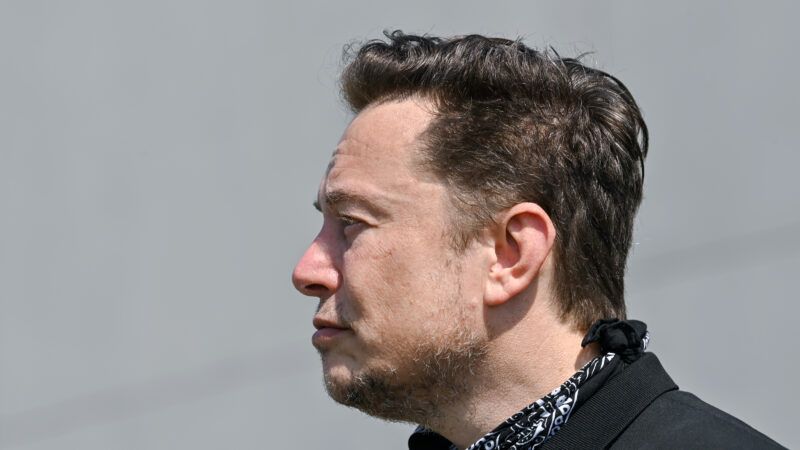United Nations Official Suggests Elon Musk Donation Could Solve Global Hunger (Kinda)
How much good can $6 billion really do?

Last month, a top United Nations official suggested in a tweet that Elon Musk, the billionaire inventor and entrepreneur, could eliminate global hunger if he would just give the U.N. 2 percent of his wealth—or around $6 billion.
In an October 19 tweet, David* Beasley, who leads the U.N. World Food Programme (WFP), congratulated Musk for passing Amazon founder Jeff Bezos for the title of world's wealthiest person—Musk's estimated to be worth around $300 billion—while also asking Musk to help the WFP "help us save 42M people from starvation for just $6.6B!!"
Musk responded, explaining in a series of tweets that he would be willing to sell $6 billion of stock in Tesla, the electric-car company he founded, if the WFP—which was awarded the Nobel Peace Prize last year—would detail publicly how the body would use the money to end global hunger.
"Please publish your current & proposed spending in detail so people can see exactly where money goes," Musk tweeted in response. "Sunlight is a wonderful thing."
"But it must be open source accounting, so the public sees precisely how the money is spent," he also tweeted.
While no one could blame Beasley for shooting his shot—I could do a lot of good with 2 percent of Musk's money, too—Beasley quickly dampened expectations for what results the WFP could achieve with $6 billion. In a tweet responding to Musk, Beasley labeled headlines about his request inaccurate, noting "$6B will not solve world hunger, but it WILL prevent geopolitical instability, mass migration and save 42 million people on the brink of starvation."
Indeed, while $6 billion is a big number, it's not "end hunger" big. For example, I wrote recently about SNAP—formerly known as food stamps—an $85-billion-per-year U.S. Department of Agriculture program that's designed to provide adequate food to Americans who might otherwise be unable to purchase it. The USDA's total overall 2021 budget is $216 billion. $6 billion, while a huge number, is tiny by comparison.
In a more detailed response to Musk this week, Beasley presented a rough sketch of how the WFP would spend a Musk donation. "This $6.6 billion will help the very neediest of the needy in this way: 1 meal a day, which only costs us 43 cents on average to provide, for 42 million people, for one year as COVID recedes," Beasley explains. He promised an "extensive detailed plan" would follow in a matter of days.
Various critics have lashed out both at the WFP and Musk. Some pointed out that the WFP's budget last year was more than $8 billion—and that if the WFP couldn't end hunger for $8 billion, then how exactly is a few extra billion going to do the trick?
As for the Musk critics, while some reports indicated it was "unclear whether Musk was serious about his offer," others are certain Musk's offer is insincere.
MSNBC commentator Hayes Brown, for example, found Musk's mere request that Beasley detail how his WFP donation would end global hunger to be just too much. Musk's offer is a "half-assed, entirely unserious move," Brown wrote in an opinion piece, titled "Elon Musk's offer to donate Tesla stock to world hunger is bogus."
While "Beasley jumped into the [Twitter] thread hoping to engage substantively," Brown writes, Musk's response—asking for details about how the WFP would spend his $6 billion donation—"all but accused the WFP of grift and opacity." Brown doesn't explain why he thinks that. If Musk were serious, Brown complains, Musk could've simply Googled how the WFP spends its funds to learn "that the program has already been clear about where the money goes." (Would Musk's donation simply go to the same place or places?) And, according to Brown, even if Musk's offer were serious, "it would still be shallow compared to what he could be doing with his money." Brown doesn't explain what Musk could be doing with his money that Brown might deem full-assed, non-bogus, and entirely serious.
Unlike Brown, I think that if Musk is indeed skeptical of the way the U.N. spends its money, his skepticism may be properly placed. After all, even some critics inside the U.N. accuse the organization of being "sclerotic, wasteful, adrift, paternalistic and patronizing."
Elon Musk is an inventor and innovator. From the little I know about him, I find it unlikely Musk would hand over billions of dollars so that top bureaucrats at gigantic public institutions such as the WFP can simply do more of what they've been doing. Does that sound like how Tesla or SpaceX or the Boring Company operates?
"You know how to make cars; we know how to feed people," Beasley wrote to Musk in yet another tweet.
No. Edsel knew how to make cars. Ford knows how to make cars. Musk knows how to change the car—and a lot of other facets of modern life—for the better.
The WFP may, as Beasley wrote, know how to feed people. But it doesn't know how to end hunger. That's why, instead of asking Elon Musk for money, Beasley should be asking him for ideas.
*Correction: This post originally referred to David Beasley by the incorrect first name.
